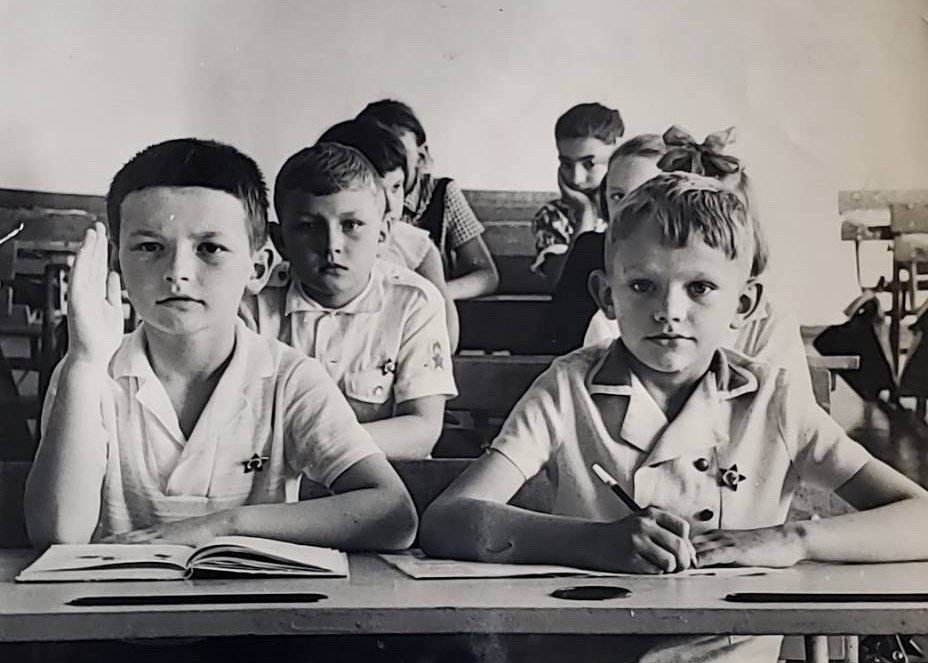Across the globe, countries have acted to address the crisis of cellphone use in schools. From school districts in California to nations such as South Korea, many school systems recognize the harm that unchecked screen use poses to student engagement and learning. In contrast, Hawaiʻi doesn't have a consistent statewide phone policy.
The following editorial was originally published in the Honolulu Star-Advertiser on Sunday, April 3, 2022 as part of the “Raise Your Hand” column in the Insight section.

By: Daria Stapolsky, Moanalua High School c/o 2024
Many Americans may think the war in Ukraine does not involve them. However, this way of thinking is very flawed. Although the conflict may seem far away, it's still directly and personally affecting Americans – one of them being my dad.
My dad was born to a Ukrainian mother and Jewish father in Kharkiv, the second-largest city in Ukraine. The year was 1964, when the country was still under the Soviet Union.
He used to tell me stories of his days in Kharkiv. A place where the delicious flavor of the fruit had no comparison to those in the US. His stamp collection was spellbinding to my child self with its unique shapes and prints. Mischievous adventures and simple joys like the fruits and stamps were what made his boyhood so rich.
Although my dad enjoyed his time in Ukraine, there were unbearable hardships caused by austerity. The communist Soviet Union limited daily essential resources and restricted contact with the outside world. Citizens were forced to rely on the black market and struggled to access foreign imports and news.
My father’s parents both longed to leave the Soviet Union. There were a mix of reasons, but the driving force to leave was seeing their relatives mistreated by the communist regime. The family finally decided to immigrate in the winter of 1973 and left their home behind, never planning to return.
“We never thought Ukraine would be an independent country at some point,” my father said. “I think that was never in our minds when we lived in the Soviet Union and even later when we lived in the United States.”
We tend to view war academically, forgetting that real individuals are being affected.
— Daria Stapolsky
Even though the nation rightfully gained independence with the collapse of the Soviet Union in 1991, Putin has always claimed that Ukraine belongs to Russia. But how can this be when Ukraine has always had its own distinct culture, language, and history separate from Russia?
Ukraine’s independence has always been precarious, but the real threat occurred when Russia launched a large-scale military invasion on February 24, 2022. After many attacks on civilian areas, Kharviv is now in complete ruins. My dad’s dream of visiting his home country after almost 47 years is now near impossible.
“This kind of slaughter is difficult and sad to see what the Ukrainian people are going through,” he said.
We tend to view war academically, forgetting that real individuals are being affected. A dear friend of mine, age 13, now lives in daily fear that she’ll lose her life at any moment. The trauma that she and many other children will have to endure is painful.
I have never been to Ukraine, nor have I ever met my relatives there whose lives are at stake. I don’t even speak the language, but none of that really matters. There is no denying that my roots are Ukrainian and that those are my people. Seeing this tragedy feels like a part of me is being torn apart.
If America values unity, justice, and democracy, then the US needs to provide more military resources, as well as humanitarian aid to the Ukrainian people. As citizens of the US, we must recognize the Ukrainian’s right to self-determination and donate to organizations that can directly help the cause. What Ukrainians need right now is the strength of humanity.

Daria’s father, Gary Stapolsky (left), raises his hand in the 2nd grade at a school in Kharkiv, Ukraine. Students wear the Soviet “Little Octoberist Badge.”
Related Articles
When people talk about the dangers of artificial intelligence, many imagine their jobs and decisions taken fromthem by machines. But the more immediate danger looks very different — that we are instead willingly surrendering to AI. The danger of artificial intelligence is not that machines may become conscious, but that people may gradually surrender skills that require independence, patience, soul and critical thinking.
For decades, the concept of patriarchy has defined our social and political discourse, framing the
world as one where men inherently hold the advantage and women are systemically disadvantaged. This narrative, which has played a powerful role in achieving gender equity, remains deeply entrenched in public consciousness.
Amid the relative quietness of Hawaii’s political landscape, the most consequential election of this year is one over 5,000 miles away: the New York City mayoral race. It’s a three-man race among Democrat Zohran Mamdani, Republican Curtis Sliwa and former New York Gov. Andrew Cuomo who is running as an independent.
